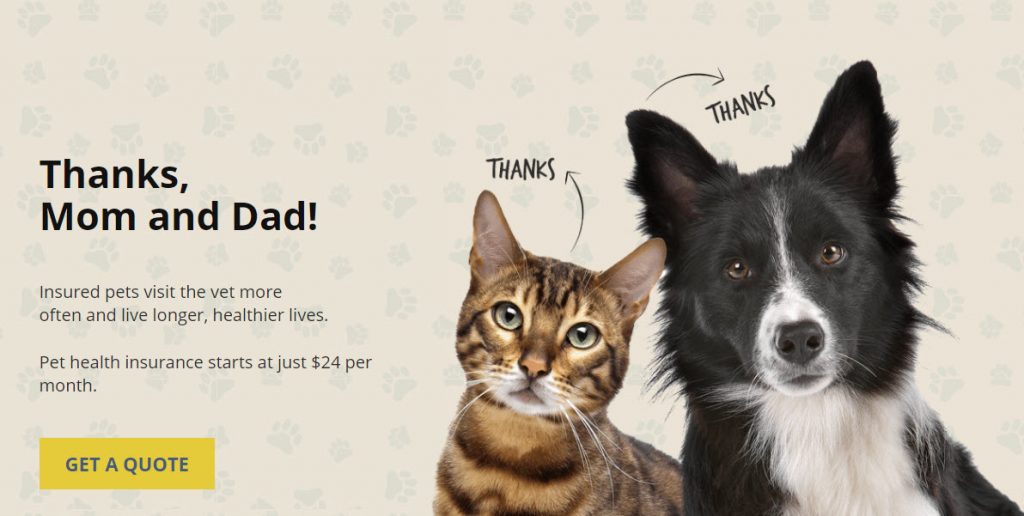Can Dogs Eat Cheese?
Free Pet Insurance Comparison
Compare Quotes From Top Companies and Save
Secured with SHA-256 Encryption
Dr. Pippa Elliott BVMS, MRCVS
Veterinarian
Dr Pippa Elliott BVMS, MRCVS is a veterinarian with over 30 years of experience in companion animal practice. In 1987 she graduated from the University of Glasgow, with a degree in veterinary medicine and surgery. She works at Blythwood Vets and the People’s Dispensary for Sick Animals (PDSA). Pippa is an advocate of Fear-Free Practice, an animal addict, and a veterinary writer. She is also w...
Veterinarian
UPDATED: Jan 8, 2024
Pet Insurance U receives compensation from the third parties included on this site. This includes payment for clicks from our site to insurance providers’ sites and quote requests generated. Our rankings and reviews are not affected by payments from the insurance companies. The compensation we receive allows the site to be free and regularly updated. Our goal is to review every pet insurance provider, but not all companies are listed on the site.
And many of the companies we review do not pay us anything. We simply rate, compare and review their plan because we feel it will be valuable to you. Our reviews are guaranteed to be unbiased, professional and advertising compensation does not influence rankings.
We are a free online resource for anyone interested in learning more about pet insurance. Our goal is to be an objective, third-party resource for everything pet insurance related. We update our site regularly, and all content is reviewed by pet insurance experts.
UPDATED: Jan 8, 2024
Pet Insurance U receives compensation from the third parties included on this site. This includes payment for clicks from our site to insurance providers’ sites and quote requests generated. Our rankings and reviews are not affected by payments from the insurance companies. The compensation we receive allows the site to be free and regularly updated. Our goal is to review every pet insurance provider, but not all companies are listed on the site.
And many of the companies we review do not pay us anything. We simply rate, compare and review their plan because we feel it will be valuable to you. Our reviews are guaranteed to be unbiased, professional and advertising compensation does not influence rankings.
On This Page
We humans love cheese (most of us do) and it’s in most of our refrigerators.
Cheese is great to add to sandwiches, omelets, soups and even just sliced on its own. And, of course, pizza, tacos.. the list is endless.
With the high protein and nutrients, cheese can be a great addition to any diet.
In fact, most of our households have at least some form of cheese even if it’s just cottage cheese.
When we cook with cheese or are just snacking on it, your dog might want to try some too.
And you’re probably wondering if it’s OK to share cheese with your dogs?
Yes, you can feed some cheese to your dogs in very small amounts as a snack.
However, before you share any human food with your pup, make sure to check with your veterinarian to see if it is alright to share with your pup.
Need Pet Insurance?
FACT: Pet insurance pays up to 90% of vet bills when your pet is sick or injured!
Is Cheese Safe for Dogs to Eat?

Cheese is safe for dogs to eat, but in small amounts, due to its higher fat content. A cube or two of cheese should be the right amount to share.
Too much cheese can be hard for a dog to digest and can upset your pups’ stomach.
Some dogs might be lactose intolerant so it’s best to try a very small amount to start.
Veterinarians generally recommend that any human food should only make up around 10% of a dog’s diet.
Benefits of Cheese For Dogs
Cheese can be a great treat for your dogs when eaten in moderation.
Dogs love the taste of cheese and it also has a lot of good nutrients, Vitamin A, calcium, B-complex and a high protein content. It can be a great incentive in training.
Cheese tend to be high in fat so make sure to share it sparingly.
Opt for the low fat chesses like mozzarella or you can even try cottage cheese as most dogs don’t need the extra fat and calories.
Cholesterol is not an issue with dogs so eggs and cheese really aren’t something to worry about.
Related: 10 Things You Must Know Before You Buy Pet Insurance
Enter your ZIP code below to view companies that have cheap pet insurance rates.
Secured with SHA-256 Encryption
Cheese Can Be Harmful To Dogs
While cheese is mostly safe for dogs, there are some things to keep in mind.
Because cheese tends to be high in fat, if you feed too much cheese to your dog on a regular basis, it can cause your dog to gain weight.
Too much cheese can also cause pancreatitis which is a very serious health problem in dogs.
Cheese that has any onions, herbs or chives should not be shared with dogs because they can be toxic.
Cheese such as goat cheese, mozzarella or even cottage cheese are lower in fat and sodium which make them a better choice.
Some dogs might even be lactose intolerant which is rare but it’s always best to watch your dog after you feed your pup anything new.
If your dog happens to have a bad reaction, make sure that you get your dog to the vet right away.
Pet insurance could help you with any of the bills if your dog does react poorly to cheese and any treatment that might be necessary.
We recommend Healthy Paws as the #1 pet health insurance provider!
Of course, you want to consult your vet with any thoughts he or she might have about adding some cheese to your pup’s diet.
If your dog is diabetic, the extra fat and calories in cheese is probably best to avoid and it might have an adverse reaction to a medication your dog is taking.
If you see any of the following symptoms after feeding your dog some cheese, you should take your dog to the vet as soon as possible:
- Coughing
- Sneezing
- Diarrhea
- Swelling
- Vomiting
Real Cost Savings from PetFirst Clients

Luna
PetFirst saved his parents
$6,712
A happy energetic Luna one morning couldn’t hold her food down. After months of multiple costly vet visits to specialists and an endoscopy, the problem was discovered and fixed. Luna put 22 pounds back on in no time and her parents were grateful for having PetFirst by their side to pay the bills.
How to Share Cheese with Your Dog
Every dog reacts to certain food differently, human and otherwise, so please make sure to check with your vet before giving your dog cheese.
If your vet says it’s OK, there are many different ways you can add a little cheese to your dog’s diet.
A few different ways you can add cheese:
- Shred cheese in a grater and put it on top of your dog’s dry food.
- Cut some mozzarella into cubes and just give it to your dog plain.
- Put a little cottage cheese on the side of your dog’s wet food for some variety.
Other Fruits And Vegetables Your Dog Might Enjoy
Most dogs love cheese, but if your dog doesn’t, here are some food items that are safe to share with your pup.
- Apples
- Bananas
- Broccoli
- Mangos
- Oranges
- Strawberries
Avocados, grapes (and raisins), as well as almonds, are NOT safe for dogs to eat and they should not sample them.

Enter your ZIP code below to view companies that have cheap pet insurance rates.
Secured with SHA-256 Encryption
Treat Your Pup to Some Cheese
Cheese can be added to your dog’s diet as a treat for a little variety or as a snack.
If you decide to share cheese with your dog, always make sure to try a sample to see that your dog doesn’t have a negative reaction to it.
Of course, pet insurance helps with many other health conditions that might occur with your dog and usually pays from 70% to 90% of all the medical or veterinary costs.
The best pet insurance companies, like Embrace, Healthy Paws and Petplan, can help you with these and any other medical bills and conditions that your dog might encounter.
Pet insurance is the assurance that your dog is always getting the best care possible without your worrying about the cost.
For more ideas on what food is safe or not safe to feed your pup, our ultimate guide to safe food for dogs can be a good start!
Other articles you may find helpful:
Is Exotic Pet Insurance Necessary?
The Best Pet Insurance By State
Fun Facts, Dog FAQ, And Unsolicited Dog Advice
5 Training Commands to Save Your Dog’s Life
The Ultimate Guide to Safe Foods for Dogs
Finding safe alternative foods for your dogs to eat can be tricky. We have a long list of articles about every food you could possibly consider feeding your dog. One thing we recommend is that you consider looking into pet insurance for your pet and you can start by checking out the best rates for dog and puppy insurance.
What to do with a Picky Eating Dog
Can Dogs Eat Grapes and Raisins?
Why You Should NEVER Give Xylitol to Your Dog

Frequently Asked Questions
Can all dogs safely eat cheese?
While most dogs can enjoy cheese in moderation, some may be lactose intolerant. It’s essential to observe your dog for any digestive issues and, if in doubt, consult with a vet before incorporating cheese into their diet.
What are the benefits of feeding cheese to dogs?
Cheese can be a great treat for dogs when given in moderation. It contains nutrients such as Vitamin A, calcium, B-complex, and high protein, making it a tasty and nutritious snack. However, it’s essential to share it sparingly due to its high fat content.
Can cheese be harmful to dogs?
While cheese is mostly safe, excessive consumption, especially of high-fat varieties, can lead to weight gain and even pancreatitis in dogs. Some types of cheese, like those with onions, herbs, or chives, can be toxic. It’s crucial to monitor your dog for any adverse reactions.
How should cheese be shared with dogs?
Before introducing cheese into your dog’s diet, consult with your veterinarian. If approved, offer small amounts as a treat or snack. Opt for low-fat cheeses like mozzarella or cottage cheese. Watch for any negative reactions, and if present, seek veterinary advice.
Are there specific symptoms indicating a bad reaction to cheese in dogs?
If your dog exhibits symptoms like vomiting, diarrhea, lethargy, or any unusual behavior after consuming cheese, it’s recommended to consult with a vet promptly. These could be signs of an adverse reaction or intolerance.
Can all dogs safely eat cheese?
While most dogs can enjoy cheese in moderation, some may be lactose intolerant. It’s essential to observe your dog for any digestive issues and, if in doubt, consult with a vet before incorporating cheese into their diet.
How can cheese be added to a dog’s diet?
If approved by a vet, cheese can be added to a dog’s diet in various ways. It can be given as a small treat, mixed with other dog-friendly foods, or used as a training incentive. Always monitor your dog’s response and adjust the quantity accordingly.
Can pet insurance help with potential health issues related to feeding cheese to dogs?
Yes, pet insurance can provide financial assistance for veterinary bills in case of health issues, including those related to feeding cheese. It’s advisable to have a comprehensive pet insurance plan to ensure your dog receives the best possible care without worrying about the cost.
What are some alternative foods safe for dogs?
If your dog doesn’t enjoy cheese, there are other safe foods to share, such as fruits (excluding avocados and grapes), vegetables, and certain nuts. Always research and ensure that the chosen food is safe for canine consumption.
Why is it important to consult a vet before introducing new foods to a dog’s diet?
Consulting a vet before introducing new foods, including cheese, is crucial to ensure your dog’s specific health needs and dietary restrictions are considered. Vets can provide personalized advice based on the dog’s breed, age, and overall health.
Enter your ZIP code below to view companies that have cheap pet insurance rates.
Secured with SHA-256 Encryption
Dr. Pippa Elliott BVMS, MRCVS
Veterinarian
Dr Pippa Elliott BVMS, MRCVS is a veterinarian with over 30 years of experience in companion animal practice. In 1987 she graduated from the University of Glasgow, with a degree in veterinary medicine and surgery. She works at Blythwood Vets and the People’s Dispensary for Sick Animals (PDSA). Pippa is an advocate of Fear-Free Practice, an animal addict, and a veterinary writer. She is also w...
Veterinarian
We are a free online resource for anyone interested in learning more about pet insurance. Our goal is to be an objective, third-party resource for everything pet insurance related. We update our site regularly, and all content is reviewed by pet insurance experts.


